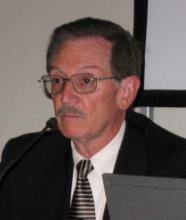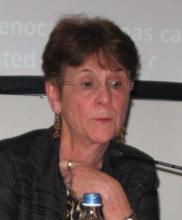AMSTERDAM – Management of advanced non–small cell lung cancer now demands molecular profiling and personalized treatment. This new era has just begun, but it will quickly transform the field over the next 4 years, Dr. David R. Gandara said in a talk on the state of lung cancer medical oncology.
Increased molecular profiling – Dr. Gandara called for routine molecular profiling for every patient with advanced NSCLC – will mean a "culture change" for the field, and a sharp turn toward "ungrouping" the universe of NSCLC patients into individuals, he told attendees at the World Conference on Lung Cancer, which was sponsored by the International Association for the Study of Lung Cancer.
"We shouldn’t even talk about non–small cell lung cancer" as though it were a single entity, said Dr. Gandara, professor and director of the thoracic oncology program at the University of California, Davis, Cancer Center in Sacramento.
He also recommended new paradigms of drug development to reflect the complex, underlying biology and the inter- and intrapatient heterogeneity of lung cancer. "Transition from empiric to rationally selected and personalized therapy is challenging," Dr. Gandara conceded. But the transition is underway and accelerating.
Until about a year ago, the only lung cancer genes undergoing routine profiling at cancer centers were those for the epidermal growth factor receptor (EGFR) and, at fewer locations, for the oncogene KRAS. Dr. Bruce Johnson, a professor of medicine at Harvard Medical School and the Dana Farber Cancer Institute, both in Boston, takes credit for starting both; his EGFR program began 7 years ago and KRAS testing has been going for 5 years, he said.
Today, testing at several major U.S. cancer centers has added investigational tests for genes such as HER2, PIK3CA, ALK, MET, MEK, BRAF, AKTI, and NRAS. The Lung Cancer Mutation Consortium is in the midst of profiling 10 genes in 1,000 patients.
"Progress has been so dramatic. All but EGFR and KRAS came in the past year," said Marileila Varella Garcia, Ph.D., professor of medical oncology at the University of Colorado in Denver and a leader of the consortium. "At the University of Colorado, it took us 18 months to optimize the test [for 10 mutations], but now we have it and it can only improve. We test for 10 mutations for the same cost as testing for one."
At the Yale Cancer Center, the routine-profiling list stands at 13 genes, said Dr. Roy S. Herbst, chief of medical oncology at Yale in New Haven, Conn. "Right now, the only test that [insurers] pay for is the EGFR mutation test. Once the ALK story is more validated, they will probably pay to find ALK translocations, but with a chip, for the same money you can also test for other mutations for research," Dr. Herbst said.
"In the United States, testing for EGFR mutations is standard of care at most top cancer centers. EGFR is an actionable mutation, with patients considered for erlotinib treatment."
Dr. Varella Garcia, Dr. Johnson, and their collaborators from the consortium reported on the first 516 patients with advanced lung cancer who were tested with the 10-gene panel. The results showed that 280 of the tumors (54%) carried at least one mutation in at least one of the 10 genes that the consortium tested.
KRAS mutations were most prevalent, in 22% of the patients, followed by EGFR mutations in 17%, ALK rearrangement in 10%, MET amplifications in 4%, and a smaller number of genetic changes in each of the other six genes tested. Most mutations were mutually exclusive, with only 3% of tumors having mutations in two different genes, and no tumors with mutations in three or more genes.
"It was surprising that they found actionable mutations in more than half of the tumors they have tested so far. That is very promising," Dr. Gandara said.
Over the next 3-4 years, further studies will likely validate additional genes and mutations, perhaps encompassing about 90% of patients with advanced-stage lung cancer by 2015, Dr. Varella Garcia said in an interview. It’s also likely that a small percentage of these cancers won’t link with any single, identifiable gene mutation and will instead depend on changes in several pathways, something much harder to sort out.
The number of "actionable" gene mutations (mutations that, once found, can receive a targeted treatment) also remains limited but growing. Until recently, the list had a single gene, EGFR. Patients with EGFR mutations are candidates for treatment with erlotinib (Tarceva) or gefitinib (Iressa, which was not approved for routine U.S. use), both drugs from the tyrosine kinase inhibitor class.



